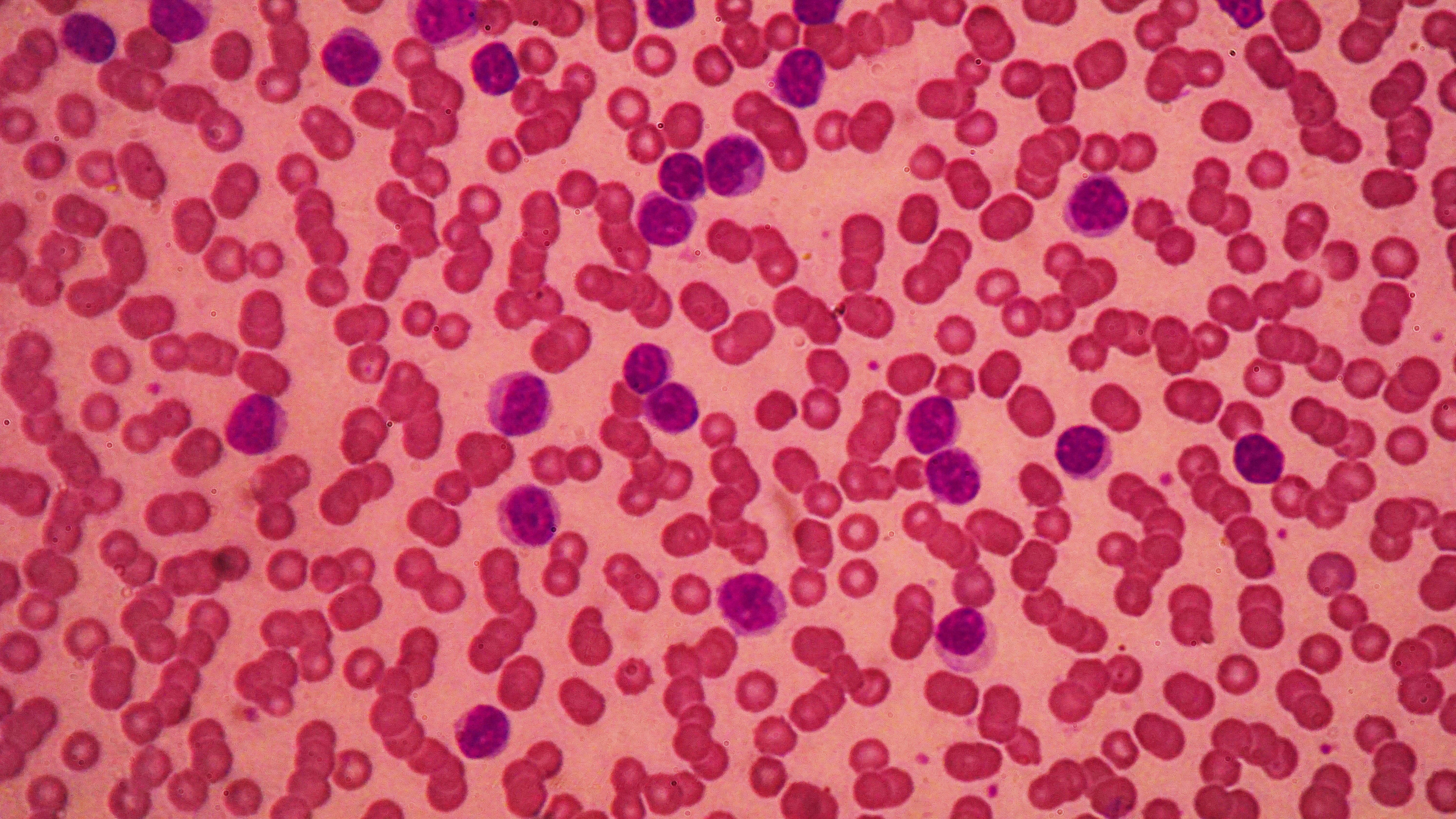Venetoclax Still Safe for CLL With COVID-19 Diagnosis
Findings from a real-world study identified that venetoclax was a safe treatment option and did not lead to higher rates of death for patients with chronic lymphocytic leukemia who were diagnosed with COVID-19.
Image of CLL cells

Patients with chronic lymphocytic leukemia (CLL) who were treated with venetoclax (Venclexta) generally presented with asymptomatic or mild cases of COVID-19 and a low 30-day mortality rate, indicating that venetoclax is a safe treatment option for CLL during the pandemic.1
“Compared with data of general CLL populations, venetoclax-treated patients in our cohort had a mild course of COVID-19 and suggest that venetoclax is a safe treatment option for CLL patients with adequately treated COVID-19,” authors of the study published in Annals of Hematology wrote.
This real-world, single-institution study from Denmark collected data from electronic patient records from 108 patients with CLL who were treated with venetoclax between August 2022 and January 2023. Most (98%) of the patients had received the recommended number of vaccines. The median age was 71 (range, 47-89), and 71% of patients were male.
Of the 108 patients, 48 (44%) tested positive on a SARS-CoV-2 PCR test; 29 patients contracted COVID-19 during venetoclax treatment, while 19 contracted it after venetoclax treatment. Of the 48 patients who tested positive, 38 (75%) were asymptomatic or had mild cases, while 12 patients had severe or critical COVID-19.
The 44% incidence rate was in accordance with the general Danish population rate of 54% between March 2020 and March 2023.
In the patients who contracted COVID-19 while receiving venetoclax, 66% (n = 19) continued treatment without altering the dose level, while 14% (n = 4) patients discontinued treatment for 2 to 60 days. In an additional 14% of patients, venetoclax treatment was permanently discontinued. Two patients died shortly after discontinuation of venetoclax; however, the causes were not considered related to COVID-19. One cause of death was reported as pulmonary cancer, while the other was Richter’s transformation. A total of 48% of patients who were diagnosed with COVID-19 were hospitalized.
Patients who were receiving ongoing venetoclax treatment and were diagnosed with COVID-19 more often received preemptive anti-SARS-Cov-2 monoclonal antibodies (83%) and other antiviral drugs (45%) than those who were not on ongoing venetoclax treatment (53% and 11%, respectively).
Secondary infections were reported in 35% of patients who were treated with venetoclax, and most were pneumonia or upper respiratory tract infection. There were no reports of fungal infections. While patients who were receiving venetoclax underwent more intensive treatment with antiviral and antibiotic agents, infections were generally more common in patients treated with venetoclax with or without COVID-19.
“…Our real-life data has shown that infections with COVID-19 generally has a mild and manageable course in venetoclax treated patients and a very low mortality mostly related to accompanying comorbidities,” study authors wrote.
The mortality rate observed in this study was lower than expected. In contrast, a multicenter international study published in Blood which evaluated COVID-19 outcomes in patients with CLL showed a mortality rate of 33%.2 However, this study collected data between February and April 2020 from centers in the US, European Union, United Kingdom, and South America when infection and death rates were generally higher than they were through August 2022 and January 2023.3
REFERENCES:
1. Thau S, Poulsen CB, Brieghel C, et al. COVID-19 severity in patients with chronic lymphocytic leukemia treated with venetoclax: a single-center observational cohort study. Ann Hematol. Published online April 18, 2024. doi:10.1007/s00277-024-05738-4
2. Mato AR, Roeker LE, Lamanna N, et al. Outcomes of COVID-19 in patients with CLL: a multicenter international experience. Blood. 2020;136(10):1134-1143. doi:10.1182/blood.2020006965
3. Johns Hopkins Coronavirus Resource Center. Accessed April 25, 2024. https://coronavirus.jhu.edu/
Leslie Reviews Relevant Data for Treatment of Relapsed/Refractory CLL
May 8th 2024During a Case-Based Roundtable® event, Lori A. Leslie, MD, discussed Bruton tyrosine kinase inhibition options for a patient with relapsed/refractory chronic lymphocytic leukemia in the first article of a 2-part series.
Read More
Acalabrutinib/Obinutuzumab Shows Improved PFS in Treatment-Naive CLL
April 10th 2024In an interview with Targeted Oncology, Jeff Sharman, MD, discussed the results of the ELEVATE-TN trial of acalabrutinib with or without obinutuzumab at 74.5 months of follow-up among patients with chronic lymphocytic leukemia.
Read More